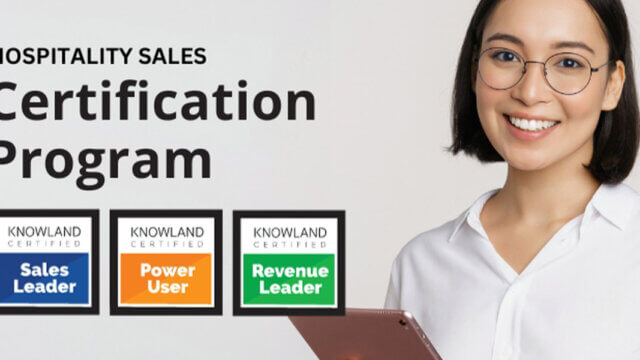Although the past several years have shown us the resiliency of our industry, staffing issues continue, particularly from the sales perspective. It has become evident that hiring and, more importantly, holding onto good sales personnel is difficult at best. With so much movement in hospitality, it’s time for sales managers to research and fully understand the necessary certifications for success in today’s marketplace.
Hospitality employers don’t have the time for lengthy onboarding and training periods required for new workers. Hiring managers are looking for measurable indicators that signify a skilled sales professional. Certifications can help with this process by narrowing the field of applicants to focus on those who can show their aptitude for a given software program.
While most large software vendors provide some form of digital learning, certifying employees in the use of critical software solutions in hospitality has only become an option in recent years. Today, successful sales personnel now have multiple opportunities to hone their skills by taking online courses, testing those skills, and, in turn, receiving certification to prove their knowledge.
Certifications are abundant, hospitality software competency is not
Certification for software application competency has been a vital hiring tool for enterprises for years. With more than 4 million certifications issued, Cisco led the charge in developing software certification through its Network Academy. It became the de facto certification and pre-requisite for anyone hoping to break into lucrative networking engineering or management careers. Today, Cisco Certifications are the gold standard in IT training. Another leader is SAS, a company awarded more than 100,000 certifications since the program’s introduction in 1999. Today, the SAS Global Certification Program offers 23 credentials across seven categories.
While some certifications are more well-known than others, some certify people in a particular software. In contrast, others certify general industry skills, such as the American Hotel & Lodging Educational Institute’s Certified Hospitality Sales Professional (CHSP) for recognizing marketing and revenue management skills. However, these certifications are geared towards trends and sales techniques instead of a specific software platform.
Then, in 2021, IDeaS became the first RMS company to offer certification for its G3 RMS product, designed for individuals who wish to showcase their knowledge as revenue managers. The certification exam tests the candidate’s ability to apply the essential skills to set up, manage and optimize revenue with IDeaS G3 RMS.
While this is a step forward for revenue management specialists, certification in software applications designed to help hospitality sales professionals has been relatively limited. There are many opportunities designed to test and certify for general knowledge in Exhibition Management, Destination Management, Government Meeting Professional and Digital Event Strategists, to name a few. However, you must dig deep to identify a healthy list of hospitality software certifications.
As technology budgets increase, so does the number of sales platforms available to staff. However, with the ongoing staff churn and labor challenges in our industry, many hoteliers are faced with training new personnel who may or may not understand the software available to help them succeed. Additionally, as the meeting and event business heats up and travelers return to the road, the urgency to fill sales roles may mean only cursory training on some systems.
Protecting software assets through the proper education
While software investments continue to increase, the secret to success is ensuring employees are fully trained in software applications, understand the nuances, and, in doing so, become more effective and efficient in their jobs. From a hospitality perspective, the past 5-10 years have brought us more integrated and complex software solutions than ever before. Property management, revenue management, customer management and operations applications have taken a giant leap in functionality. But has the training associated with these changes kept pace?
The challenge is that today’s data-driven applications require a higher-level skill set to take full advantage of their capabilities. We are all guilty of using what we need to get results and forgetting about the rest. Even basic programs such as Word and Excel require training for users to take full advantage of their vast capabilities.
As software-as-a-service developers continue to enhance and design additional product features, it is easy to fall behind in competency. Add the ongoing staff turnover and the need to hire quickly and get an employee up to speed. We can see how software capabilities often take a back seat, or at least those capabilities that are beyond basic features.
There are three key areas to consider when implementing a new software platform:
- Awareness and training. Educating users who are unaware of an application’s full capabilities or have not received the proper training is critical to the success of the software.
- Complexity and fear. Software with a steep learning curve or complex features may deter users from exploring and utilizing its complete properties. Ensuring staff is well trained in the software they use every day will mean a more content and productive team.
- Customization. Users can sometimes customize or configure an application to match a business’s specific needs, which may involve utilizing more features. However, if they haven’t received proper training, customization could prove disastrous for your business. Make sure you designate someone either on-property or off who is responsible for these customizations.
By certifying your existing staff or requiring certification as part of the hiring process, you can be assured you will receive the ROI promised by the software vendor.
Certification for power users
There is something to be said about the adage, “You can teach skills, but you can’t teach passion.” Sales leaders must have an appetite for experimentation and a willingness to test against their expectations in search of new, valuable insights.
If the next wave of hotel sales teams is looking for ways to draw attention to themselves in a crowded labor market, one of the best ways is to research sales tools across the industry and their certifications. Once they have identified their certification of choice, students can follow the program’s prerequisite requirements.
As you build your sales strategy to meet today’s demanding guests, ask yourself these five questions:
- Are you ensuring enough time is dedicated for new team members to take online courses to better understand the nuances of a platform?
- When looking for potential employees, have you designated which software applications potential employees should be familiar with? How do you determine they are telling the truth?
- Have you designated a specific “software guru” to train and guide new sales teams and ensure the software is updated and customized to suit your property?
- Is there a strategy for ongoing training of existing staff on new features and functionality of your software investment as they occur?
- If you are an enterprise, is there a designated off-property manager responsible for ensuring your software investment is used to its fullest potential? Are you able to track who is using the software correctly and who is not?
Today’s sales teams have more tools than ever, but that is only part of the equation. A desire for experimentation, natural inquisitiveness, and an openness to collaboration are vital attributes of successful sales teams. Hospitality software certification can help employees excel in their current positions and show that they are among the best in their profession. Education will also increase motivation and cultivate loyalty as they progress toward their career goals.
For employers, software certification is an assurance existing teams know how to use these tools and that new employees can demonstrate their knowledge. By requiring certification or providing the opportunity for users to become certified, management can rest assured they are hiring someone who knows the software. At the same time, employees can illustrate their expertise and chart a path to success.
Jessica Carey is head of customer success at Knowland.
This is a contributed piece to Hotel Business, authored by an industry professional. The thoughts expressed are the perspective of the bylined individual.


